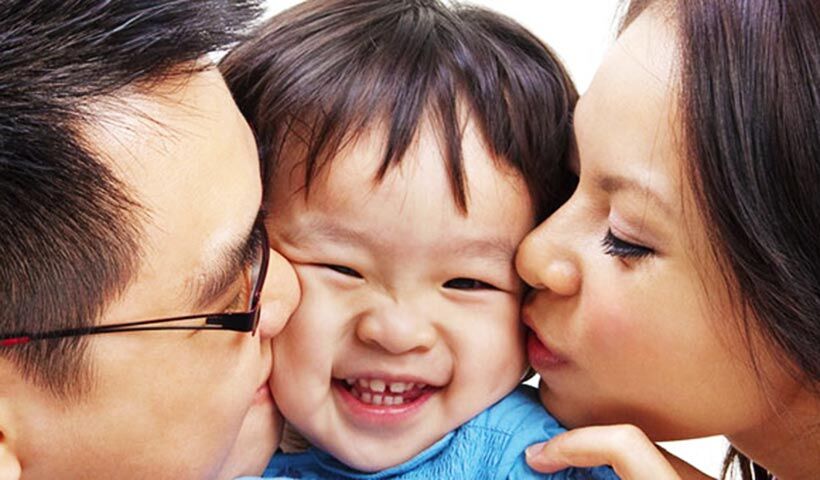Gender
Boys and girls are available for adoption, but if requesting an unidentified child, the referral process for a boy is typically less lengthy. Some agencies allow families to specify gender; some do not.
Ages
Children aged 1 to 15 years may be adopted, though in practice it is relatively unusual to see kids over the age of 10 referred to non-Thai-speaking families). Recent reports (2007) indicate that some non-U.S. families requesting young/healthy/unidentified children through the DSDW-direct quota system, and approved to adopt children age 0-12, have received referrals of younger children and been able to adopt before the child’s first birthday.
Twins or sibling groups
May be occasionally available. Other than twins and non-twin siblings, it is not possible to adopt more than one Thai child at a time, unless you are adopting the children of your Thai spouse.
Conditions
Most Thai children waiting for adoption live in orphanages. Many of these are government-run, such as the large Pakkred (Bangkok area) and Viengping (Chiang Mai) babies homes and many other babies’ and children’s homes throughout the nation. Some orphanages are run by NGOs or other private charities (both religious and secular). Examples of this type include the Thai Red Cross Children Home and the Friends for All Children orphanage (both in Bangkok), Pattaya Orphanage in Chonburi, and the Agape Home in Chiang Mai. Some foster care programs exist, where children live with foster families until adoptive placement. Examples include the Holt Sahathai/Holt International program (focused primarily on adoption of young/healthy children), and foster care for some children who are in the care of the Friends for All Children Foundation, particularly in the Chiang Mai area.
Health and Development
Families may request healthy or special-needs children. Families should be aware that even “healthy” children who have spent formative periods in institutions will have developmental delays ranging from minor to quite significant (gross/fine motor skills, cognitive skills, speech/language skills, and/or emotional maturity and attachment issues). The longer the time spent in an institution, the more marked the deficits are likely to be. Arming yourself with information before you adopt is a key to successfully handling the issues that may arise.
Eligibility for Adoption
The Child Adoption Board of Thailand (which includes key officials of the Thai Dept. of Social Development and Welfare, plus some other authorities) must sign off on all adoptions of Thai children, including adoptions of children in care of the DSDW, children in care of designated NGOs, and children who are relatives or acquaintances of the prospective adoptive family. If birth-parent(s) are known, children must have been legally relinquished under Thai law. If the child has been abandoned, Thai officials make an effort to find genetic family before allowing the child to be adopted.
The slow speed of the investigation and the sign-off process is one main reason that infant adoption is virtually non-existent in Thailand, and even the youngest available children are usually 1 to 2 years old. Many children in Thai orphanages have one or both parents still living; parents may be impoverished, imprisoned, or otherwise unable to care for a child, but may never have signed relinquishment papers. Therefore, though thousands of children live in Thai orphanages, a high percentage of them are not eligible for adoption, either domestically or internationally.
Family Requirements
Thai law does not stipulate a long list of family requirements. Adoptive families must be legally qualified to adopt in their home states/countries. Married couples must consist of a man and woman who are both at least 25 years old. Single women (not men) can petition to adopt special-needs children only; however, the Thais’ definition of “special needs” remains somewhat unclear. (For instance, it is not clear whether the definition automatically includes waiting children who are basically healthy, but older. Consult your agency for the latest details.)
The upper age limit for parents is not codified by Thai law. Rules will vary depending on where your agency is going to submit your dossier (to DSDW or an NGO), and the agency’s own policies. NGOs and adoption agencies can both impose their own rules (beyond Thai federal law) defining what parent ages are considered “too young” or “too old.” It is important to specify the age that you want and discuss it with your agency.
In general, parents in their late 20s and in their 30s will encounter no difficulty regarding their ages and should be eligible to adopt both young and older children. (However, a minimum 15-year age gap between the younger parent and the child is required by Thai law.) Parents in their early 40s may be asked to adopt a somewhat older child (older toddler or preschooler). Parents in their late 40s may be qualified to adopt school-aged children or (possibly) younger children with special needs. Couples, where both parents are over 50, are much less likely to be allowed to adopt. Again it is very important to discuss your individual situation with each agency you are considering.
All of the following should be taken as generalities based on agency experience and observed patterns of practice, rather than hard and fast rules. For instance, small families are generally preferred (two existing children or fewer), but this preference may be waived, particularly for waiting children. Some families with a handful of children at home (only 3, in one case, all previously adopted in Thailand) have been denied requests to adopt; however, some other, larger families have been approved. The DSDW is apparently considering all requests from larger families on a case-by-case basis.The number of children currently in the household (vs. older children no longer living there) would also be weighed by DSDW.
For a married couple, a total of two divorces (one per spouse, or two for one spouse) is apparently acceptable. Length of marriage, and length of remarriage after a divorce/s are not codified by the adoption law, but a family that’s extremely newly married, especially after divorce, might encounter some difficulties, so you must consult your agency for opinions on your specific situation. Couples need not be infertile, though fertility documentation may be requested, and a pregnancy during the process will delay, and may derail, a Thai adoption. (Thai officials may agree to put your application on hold for a while if you are seeking to adopt an unidentified child, but will probably not approve a request to adopt an identified special needs child if you become pregnant during the process).
The Thai authorities carefully scrutinize family income and seek evidence that a family can provide for its children. Detailed income documentation is required, and families should be prepared to provide it – but wealth is not a program requirement, and the Thai law does not specify income levels. Serious illnesses of the parents would be evaluated on a case-by-case basis and could prevent an adoption. The Thais do not have a codified weight limit for parents as some sending countries (e.g. Korea, China) now do. However, recent (2006) anecdotal reports indicate that the DSDW/Child Adoption Center is increasingly concerned about this and has rejected a few families for being unacceptably overweight (and thus, presumably, more likely to have serious health issues that would interfere with parenting).
As with most international programs, some requirements may be waived for the adoption of a waiting or special needs child. Consult us for more details. Please use the form below.




































